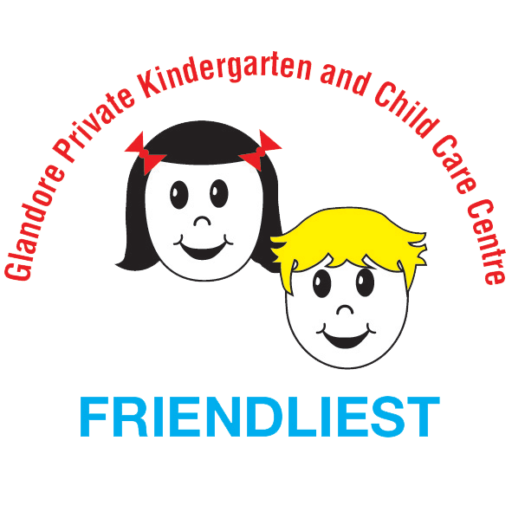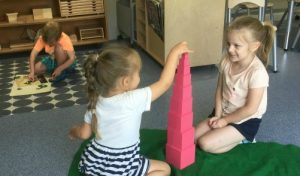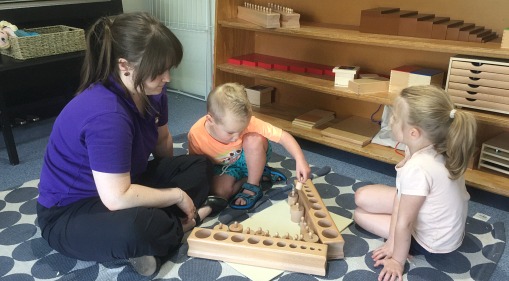
Our Montessori Program at Glandore
Last month we introduced a Montessori Program into the centre. Our Early Childhood Teacher Bethany, has advanced qualifications in Montessori education. Although we aim to extend the program to all rooms in the centre, we are currently offering the structured program to the children in PreKindy and Kindy. The children have two sessions of an hour and a half each week with Bethany. Our other educators are also attending Montessori training, and they are incorporating more “Practical Life” skills into the routines in all the rooms. Bethany is sending regular reports to parents about the children’s progress.
In this post I would like to give you a brief introduction to the Montessori education method and philosophy. We believe that the Montessori philosophy blends well with our centre philosophy, and the Montessori education method aligns well with our exceptional educational programs. Children in PreKindy and Kindy will have enhanced school readiness through using the hands-on materials for learning letters and mathematical concepts, and through experiencing the wider Montessori curriculum.
The Montessori Method of education, developed by Dr. Maria Montessori, is a child-centred educational approach based on scientific observations of children from birth to adulthood. Dr. Montessori’s Method has been time tested, with over 100 years of success in diverse cultures throughout the world.
It sees children as naturally eager for knowledge and capable of initiating learning in a supportive, thoughtfully prepared learning environment. It is an approach that values the human spirit and the development of the whole child—physical, social, emotional, cognitive.
Benefits of Montessori Education
Montessori students learn to think critically, work collaboratively, and act boldly—a vital skill set for the 21st century. Montessori education offers children opportunities to develop their potential as they step out into the world as engaged, competent, responsible, and respectful citizens with an understanding and appreciation that learning is for life.
Each child is valued as a unique individual. Montessori education recognizes that children learn in different ways, and accommodates all learning styles. Students are also free to learn at their own pace, each advancing through the curriculum as he/she is ready, guided by the teacher and an individualized learning plan.
Beginning at an early age, Montessori students develop order, coordination, concentration, and independence. Classroom design, materials, and daily routines support the individual’s emerging self-regulation.
Students are part of a close, caring community. The multi-age classroom resembles a family structure. Older students enjoy being mentors and role models; younger children feel supported and gain confidence. Teachers model respect, loving kindness, and a belief in peaceful conflict resolution.
Montessori students enjoy freedom within limits. Working with their teachers, students are active participants in deciding what their focus of learning will be. The child’s curiosity and interest results in joyous learning.
Students are supported in becoming active seekers of knowledge. Teachers provide environments where students have the freedom and the tools to pursue answers to their own questions.
Self-correction and self-assessment are an integral part of the Montessori education. As they mature, students learn to look critically at their work, and become adept at recognizing, correcting, and learning from their errors.
There are four areas of learning in a Montessori 3-6 class: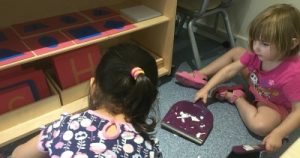
Practical Life
In this section of work, children find materials and exercises from their every day life – eg. pouring water from a jug to a glass, or learning how to tie a shoelace. These activities help children’s independence.
Sensorial
Activities in this section allow children to refine each of their senses. They will appreciate color or texture differences, organise objects in the environment and refine their sense of pitch from the music they hear .
Language
Children are taught language through a progression of lessons. They first learn the different sounds in a word. Children then learn language phonetically. Later they learn the different “rules” in language and the exceptions to those rules. They will learn to spell and read fluently
Mathematics
Children first learn to count from 1-10 through understanding the concept that those numbers represent a specific amount. Progressing through the materials children will learn addition, subtraction, multiplication and division and truly understand what each one means in a deeper sense. Montessori offers the child a strong and solid foundation in the understanding of mathematics.
Culture
The Cultural area of the Montessori classroom covers a variety of subjects. Geography, Science, Botany, Zoology, and History are included. Art and Music are also considered a part of the Cultural Area of the classroom. Maria felt that having knowledge and understanding of such subjects is what makes one a “cultured” person.
Sites on the internet that have videos of the materials, and explanations of the equipment are –
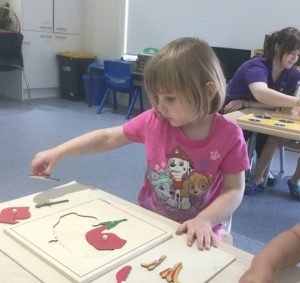 American Montessori Society (2017) https://amshq.org/Montessori-Education/Introduction-to-Montessori/Benefits-of-Montessori, Montessori Australia Foundation (2017) https://montessori.org.au/about-montessori
American Montessori Society (2017) https://amshq.org/Montessori-Education/Introduction-to-Montessori/Benefits-of-Montessori, Montessori Australia Foundation (2017) https://montessori.org.au/about-montessori
Montessori Australia Foundation (2017) https://montessori.org.au/montessori-materials
http://www.justmontessori.com/
